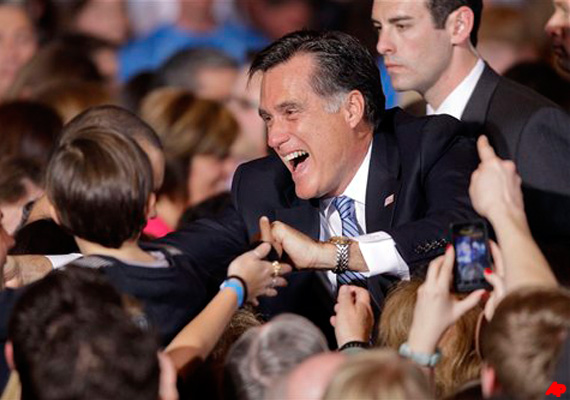
Las Vegas, Feb 6: Republican presidential front-runner Mitt Romney looked to caucus contests in three more states this week hoping to solidify the growing sense of inevitability surrounding his candidacy to challenge President Barack Obama in the November election.
With back-to-back victories fueling him, Romney was preparing for the Colorado, Minnesota and Maine nominating contests as main rival Newt Gingrich brushed aside talk of abandoning his White House bid.
That all but ensured the contest will stretch at least into the spring.
Gingrich, the former speaker of the House of Representatives, on Sunday emphatically renewed his vow to campaign into the party convention in Tampa, Florida, in late August, despite losing badly to Romney in Saturday's Nevada caucuses.
Gingrich said his goal was to "find a series of victories which by the end of the Texas primary will leave us at parity" with Romney by early April.
Romney, a former Massachusetts governor and ex-CEO of a private equity firm, held a double-digit lead Sunday morning over his nearest pursuer as the totals mounted in Nevada, where fellow Mormons accounted for roughly a quarter of all caucus-goers.
Gingrich and Texas Rep. Ron Paul vied for a distant second.
Former Pennsylvania Sen. Rick Santorum trailed the field.
Gingrich continued to shrug off Nevada's caucus results in an appearance Sunday on NBC television's "Meet the Press."
"This is the state he won last time, and he won it this time," he said of Romney. "Our goal is to get to 'Super Tuesday' where we're in much more favorable territory."
Gingrich is hoping for a strong showing on March 6, the so-called "Super Tuesday," when 11 states hold Republican nominating contests, including several Southern states which the former Georgia congressman sees as friendly terrain.
But first, Gingrich must make it through Colorado and Minnesota, which both hold caucuses Tuesday, and Maine, which ends its caucuses on Saturday.
February is a month that promises to be as plodding as January was rapid-fire in the presidential race.
Romney will look to maintain his position of strength, if not build upon it, as his rivals continue working to derail him even as their options for doing so narrow with each victory he notches.
Santorum narrowly won the leadoff caucuses in Iowa and has trailed in the contests since then. He nonetheless insisted on Sunday that "our numbers are moving up continually."
"I think we're going to show improvement. This race is a long long way from being over," he said on Fox News Sunday.
And on ABC's "This Week," Paul maintained the results show voters are still up for grabs.
"I get energized because I know there's a large number of people who are looking for another option," Paul said.
With votes from 87 percent of Nevada's precinct caucuses tallied, Romney had 48 percent, Gingrich 22 percent, Paul 19 percent and Santorum 11 percent.
Votes were still being tallied in Clark County, the state's most populous and home to the Las Vegas Strip, where officials stayed up until the wee hours of Sunday morning counting ballots, but still couldn't finish the task.
The fate of the state party's 28 delegates remained unknown.
State party officials estimated the outcome would probably show Newt Gingrich in second place, followed closely by Ron Paul, but for most of Sunday, they didn't have the hard votes to shore up their projections.
Romney's victory capped a week that began with his double-digit win in the Florida primary.
That contest was as intense as Nevada's caucuses were sedate __ so quiet that they produced little television advertising, no candidate debates and only a modest investment of time by the contenders.
A total of 28 Republican National Convention delegates were at stake in caucuses held across the sprawling state. Romney won at least 10, Gingrich at least four, Paul at least three and Santorum at least two.
That gives Romney a total of 97, including endorsements from Republican National Committee members who will automatically attend the convention and can support any candidate they choose. Gingrich has 30, Santorum 16 and Paul seven.
It will take 1,144 delegates to win the Republican nomination.

















